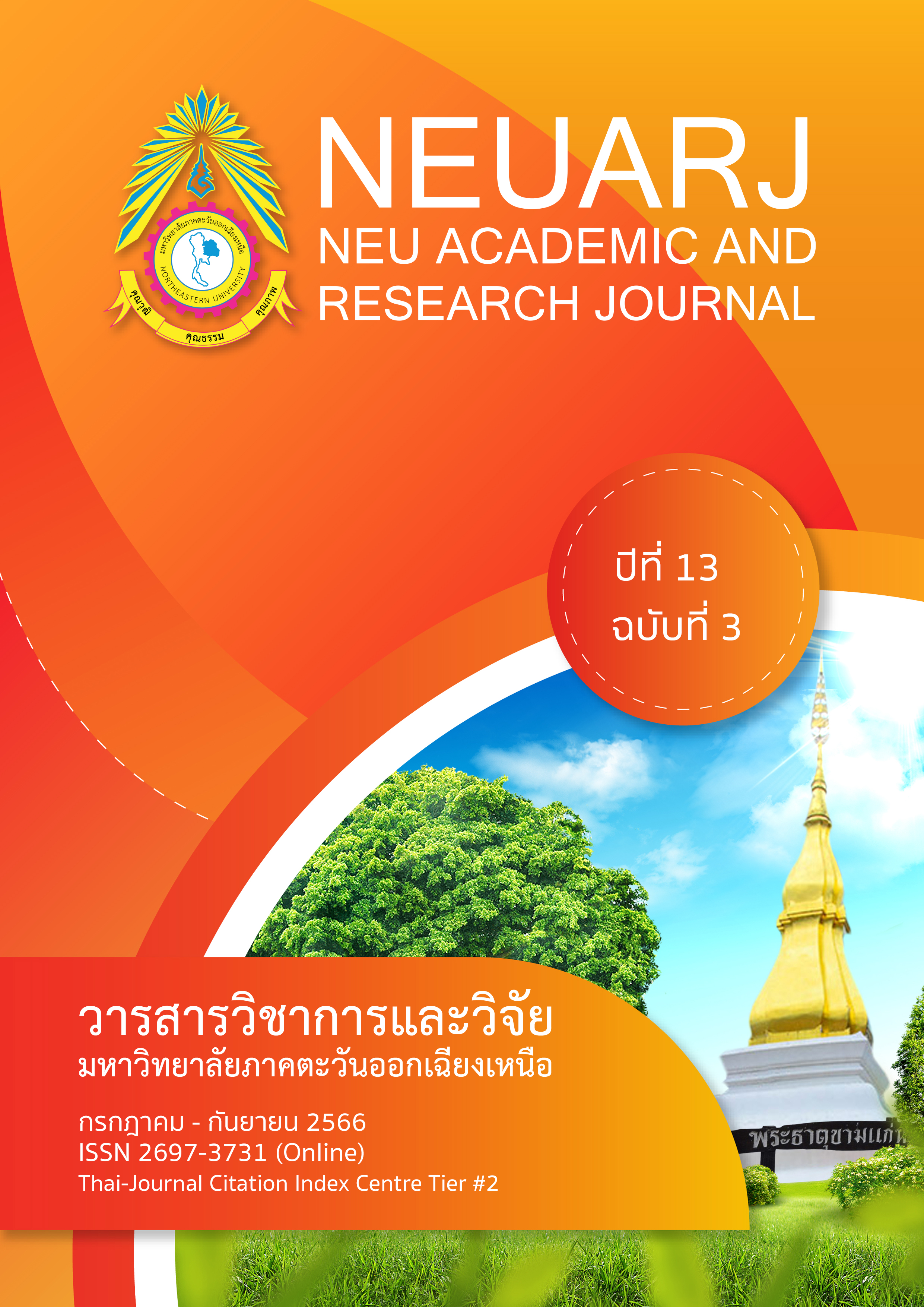การศึกษาผลการใช้การจัดการเรียนรู้แบบสืบเสาะหาความรู้ (5E) ร่วมกับ การใช้เกมกระดาน เรื่อง ดาวในระบบสุริยะ เพื่อส่งเสริมสมรรถนะการอธิบายปรากฏการณ์ เชิงวิทยาศาสตร์ ของนักเรียนชั้นประถมศึกษาปีที่ 4
คำสำคัญ:
การจัดการเรียนรู้แบบสืบเสาะหาความรู้ (5E), เกมกระดาน, สมรรถนะการอธิบายปรากฏการณ์เชิงวิทยาศาสตร์บทคัดย่อ
การวิจัยครั้งนี้มีวัตถุประสงค์ 1) เพื่อเปรียบเทียบความสามารถในการอธิบายปรากฏการณ์ในเชิงวิทยาศาสตร์ก่อนและหลังการใช้การจัดการเรียนรู้แบบสืบเสาะหาความรู้ (5E) ร่วมกับการใช้เกมกระดานเรื่อง ดาวในระบบสุริยะ ของนักเรียนชั้นประถมศึกษาปีที่ 4 2) เพื่อศึกษาความพึงพอใจต่อการจัดการเรียนรู้แบบสืบเสาะหาความรู้ (5E) ร่วมกับการใช้เกมกระดาน เรื่อง ดาวในระบบสุริยะของนักเรียนชั้นประถมศึกษาปีที่ 4 กลุ่มตัวอย่างคือ นักเรียนชั้นประถมศึกษาปีที่ 4 โรงเรียนประถมศึกษาแห่งหนึ่งในจังหวัดกรุงเทพมหานคร ที่กำลังศึกษาอยู่ในภาคเรียนที่ 2 ปีการศึกษา 2565 จำนวน 31 คน ที่ได้มาจากการสุ่มแบบกลุ่ม (Cluster Sampling) เครื่องมือที่ใช้ในการวิจัยครั้งนี้คือ 1) แผนการจัดการเรียนรู้แบบสืบเสาะหาความรู้ (5E) ร่วมกับการใช้เกมกระดาน 2) สื่อการเรียนรู้เกมกระดาน เรื่อง ดาวในระบบสุริยะ 3) แบบทดสอบวัดความสามารถในการอธิบายปรากฏการณ์ในเชิงวิทยาศาสตร์ เรื่อง ดาวในระบบสุริยะ 4) แบบวัดความพึงพอใจต่อการจัดการเรียนรู้แบบสืบเสาะหาความรู้ (5E) ร่วมกับการใช้เกมกระดาน วิเคราะห์ข้อมูลโดยใช้สถิติดังนี้คือ ค่าเฉลี่ย ส่วนเบี่ยงเบนมาตรฐานและการทดสอบค่าที
ผลการวิจัยพบว่า 1) นักเรียนที่ได้รับการใช้การจัดการเรียนรู้แบบสืบเสาะหาความรู้ (5E) ร่วมกับการใช้เกมกระดานเรื่อง ดาวในระบบสุริยะ มีสมรรถนะการอธิบายปรากฏการณ์ในเชิงวิทยาศาสตร์หลังเรียนสูงกว่าก่อนเรียนอย่างมีนัยสำคัญทางสถิติที่ระดับ .05 2) นักเรียนที่ได้รับการจัดการเรียนรู้แบบสืบเสาะหาความรู้ (5E) ร่วมกับการใช้เกมกระดานเรื่อง ดาวในระบบสุริยะ มีความพึงพอใจอยู่ในระดับมาก ( = 2.66, S.D = 0.12)
เอกสารอ้างอิง
กระทรวงศึกษาธิการ. (2560).หลักสูตรแกนกลางการศึกษาขั้นพื้นฐาน พุทธศักราช 2551 ฉบับปรับปรุง 2560. กรุงเทพฯ: โรงพิมพ์ชุมนุมสหกรณ์การเกษตรแห่งประเทศไทย.
โครงการประเมินผลร่วมกับนานาชาติ (PISA), สถาบันส่งเสริมการสอนวิทยาศาสตร์และเทคโนโลยี. ความฉลาดรู้ทางด้านวิทยาศาสตร์. สืบค้นเมื่อ 11 พฤศจิกายน 2563, จาก https://pisathailand.ipst.ac.th/about-pisa/scientific-literacy/
ช่อผกา สุขุมทอง. (2563). การจัดการเรียนรู้แบบสืบเสาะหาความรู้ (5E) ร่วมกับเกมวิทยาศาสตร์เรื่องการเปลี่ยนแปลงของโลกระดับประถมศึกษา. (วิทยานิพนธ์ปริญญามหาบัณฑิต, มหาวิทยาลัยทักษิณ).
ชัยวัฒน์ สุทธิรัตน์. (2554). การจัดการเรียนรู้แนวใหม่ : ทฤษฎี แนวปฏิบัติ และผลการวิจัย. นนทบุรี: สหมิตรพริ้นติ้งแอนด์พับลิสชิ่ง.
นภาศรี สงสัย, และ ทิพรัตน์ สิทธิวงศ์. (2563). การศึกษาผลการใช้บอร์ดเกมประกอบการเรียนการสอนรายวิชาวิทยาศาสตร์ เรื่อง ระบบนิเวศเพื่อส่งเสริมความสามารถในการคิดวิเคราะห์ สำหรับนักเรียนชั้นมัธยมศึกษาปีที่ 3 โรงเรียนศรีสำโรงชนูปถัมภ์. วารสารกลุ่มมนุษยศาสตร์ - สังคมศาสตร์, 3(2), 1- 11. สืบค้นเมื่อ 17 มกราคม 2565, จาก https://ejournals.swu.ac.th/index.php/cemt/article/view/12575
นลินนิภา ชัยกาศ. (2565). การจัดการเรียนรู้แบบสืบเสาะหาความรู้ 5 ขั้นร่วมกับเกมกระดานที่มีต่อผลสัมฤทธิ์ทางการเรียน เรื่อง พลังงานบนโลกของเรา ของนักเรียนชั้นประถมศึกษาปีที่ 3. (วิทยานิพนธ์ปริญญาการศึกษามหาบัณฑิต, มหาวิทยาลัยมหาสารคาม). สืบค้นเมื่อ 17 มกราคม 2565, จาก http://202.28.34.124/dspace/bitstream/123456789/1644/1/ 63010552022.pdf
นวลจิตต์ เชาวกีรติพงศ์. (2562). การส่งเสริมความสามารถในการสร้างคำอธิบายเชิงวิทยาศาสตร์ของผู้เรียนด้วยการสอนแบบสืบเสาะหาความรู้. วารสารศึกษาศาสตร์ มสธ, 12(1), 1-15. สืบค้นเมื่อ 20 ธันวาคม 2564, จาก https://so05.tci-thaijo.org/index.php/edjour_stou/article/ download/145237/140277/611315
นันทิยา บุญเคลือบ. (2540). มาตรฐานการศึกษาวิทยาศาสตร์. ใน พงษ์ชัย ศรีพันธุ์ (บรรณาธิการ), วารสาร สสวท. (หน้า 7-12). กรุงเทพฯ: หน่วยการพิมพ์ สสวท.
ประสาท เนืองเฉลิม. (2558). การเรียนรู้วิทยาศาสตร์ในศตวรรษที่ 21. กรุงเทพฯ: จุฬาลงกรณ์มหาวิทยาลัย.
พระราชบัญญัติการศึกษาแห่งชาติ พ.ศ. 2542. (2542). ราชกิจจานุเบกษา, 116(74ก), 1-19.
สถาบันทดสอบทางการศึกษาแห่งชาติ. (2563). ระบบประกาศและรายงานผลสอบโอ-เน็ต. สืบค้นเมื่อ 13 มกราคม 2565, จาก http://www.newonetresult.niets.or.th/
สถาบันทดสอบทางการศึกษาแห่งชาติ. (2564). ระบบประกาศและรายงานผลสอบโอ-เน็ต. สืบค้นเมื่อ 13 มกราคม 2565, จาก http://www.newonetresult.niets.or.th/
สถาบันส่งเสริมการสอนวิทยาศาสตร์และเทคโนโลยี. (2555). ครูวิทยาศาสตร์มืออาชีพแนวทางสู่การเรียนการสอนที่มีประสิทธิผล. กรุงเทพฯ: อินเตอร์เอ็ดดูเคชั่น ซัพพลายส์.
สถาบันส่งเสริมการสอนวิทยาศาสตร์และเทคโนโลยี. (2561). ผลการประเมิน PISA 2018 การอ่าน คณิตศาสตร์ และวิทยาศาสตร์. สืบค้นเมื่อ 14 มกราคม 2565, จาก https://pisathailand.ipst.ac.th/pisa2018-fullreport/
สมชาย รัตนทองคำ. (2556). ทฤษฎีการเรียนรู้ของนักการศึกษาที่มักถูกนำมาใช้พัฒนาด้านการเรียนการสอน เอกสารประกอบการสอนเทคนิคการแพทย์. ขอนแก่น: มหาวิทยาลัยขอนแก่น. (อัดสำเนา).
อนรรฆพร สุทธิสาร, และ อัมพร วัจนะ. (2564). การพัฒนาหนังสืออิเล็กทรอนิกส์ วิชา วิทยาศาสตร์ เรื่อง เซลล์ สำหรับนักเรียนชั้นมัธยมศึกษาปีที่ 1 ร่วมกับการจัดการเรียนรู้แบบสืบเสาะหาความรู้ 5E. วารสารวิชาการและวิจัย มหาวิทยาลัยภาคตะวันออกเฉียงเหนือ, 11(1), 244-259. สืบค้นเมื่อ 3 มกราคม 2566, จาก https://so04.tci-thaijo.org/index.php/neuarj/article/view/248234/170478
Adriana, C. & Jessamyn, A. F. (2019). Game-Based Learning to Engage Students with Physics and Astronomy Using a Board Game. International Journal of Game-Based Learning, 9(1), 42-58. doi: 10.4018/IJGBL.2019010104
Bayeck, R. Y. (2020). Examining Board Gameplay and Learning: A Multidisciplinary Review of Recent Research. Simulation & Gaming, 51(4), 1-21. doi: 10.1177/1046878119901286
Beyer, C. J. and Davis, E. A. (2008). Fostering second graders’ scientific explanations : A beginning elementary teacher’ s knowledge, beliefs, and practice. The Journal of the Learning Sciences, 17 (3), 381-414. doi: 10.1080/10508400802222917
McNeill, K. L., and Krajcik, J. (2008). Scientific Explanations: Characterizing and Evaluating the Effects of Teachers’ Instructional Practices on Student Learning. Journal of Research in Science Teaching, 45 (1), 53-78. doi: 10.1002/tea.20201

ดาวน์โหลด
เผยแพร่แล้ว
รูปแบบการอ้างอิง
ฉบับ
ประเภทบทความ
สัญญาอนุญาต
ลิขสิทธิ์ (c) 2023 วารสารวิชาการและวิจัย มหาวิทยาลัยภาคตะวันออกเฉียงเหนือ

อนุญาตภายใต้เงื่อนไข Creative Commons Attribution-NonCommercial-NoDerivatives 4.0 International License.


